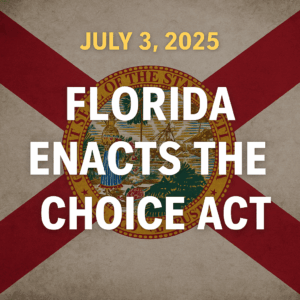July 08, 2025 | Posted By: Emma Doull
On July 3, 2025, Florida officially enacted the CHOICE Act, short for the Contracts Honoring Opportunity, Investment, Confidentiality, and Economic Growth Act. While much of the country moves toward limiting or banning noncompete agreements, Florida has taken the starkly different approach of strengthening the enforceability of noncompete agreements, particularly for high-earning employees and independent contractors. The CHOICE Act marks a significant shift in how employers can protect their business interests through post-employment restrictions.
Unlike recent actions by the Federal Trade Commission and various states facilitating employee mobility and invalidating restrictive covenants, Florida’s new law reaffirms and expands the legal foundation for noncompete and garden leave agreements. The CHOICE Act makes clear that such agreements are presumptively valid for individuals defined as “covered employees.” Covered employees include both W-2 employees and independent contractors who earn, or are expected to earn, more than twice the annual mean wage of the county in which the employer’s principal place of business is located, or, if the employer is headquartered out of state, the county where the worker resides.
It’s important to note that the definition of “salary” under the CHOICE Act is narrowly construed. It excludes health benefits, tips, retirement contributions, expense reimbursements, discretionary bonuses, commissions, and ownership distributions. As a result, employees who appear to meet the income threshold based on total compensation may not actually qualify as a “covered employee” under the statute. Additionally, the Act entirely excludes healthcare practitioners from the definition, meaning that the law does not apply to doctors, nurses, and other licensed medical professionals.
The CHOICE Act defines “covered noncompete agreements” as written agreements, enforceable for a maximum of four years, that prohibit a covered employee or contractor from assuming a new position within a specified geographic area. The restriction applies when the role involves either providing services similar to those the individual provided in the three years prior to the noncompete period or where the individual would likely use the employer’s confidential information or client relationships. This is a broader definition than what was previously accepted under Florida law, and it significantly expands the enforceability of noncompete clauses.
Prior to the CHOICE Act, Florida law, specifically Florida Statute § 542.335, presumed that noncompete agreements longer than two years were unreasonable. The new law doubles the permissible period to four years, giving employers more flexibility and control over employee transitions. For businesses concerned about protecting proprietary information, customer data, and strategic plans, this extended timeline is a substantial benefit.
Aside from duration and scope, the CHOICE Act enhances other enforcement mechanisms for employers. Notably, it entitles employers to a preliminary injunction against the former employee and, if applicable, the new employer. This means companies can quickly seek court-ordered relief to prevent a former worker from violating a noncompete agreement, without the need to prove irreparable harm, an often difficult hurdle under traditional injunction standards. Furthermore, if the employer prevails in litigation, the law provides for an award of attorney’s fees and monetary damages. This strong set of remedies gives Florida employers added leverage and increases the legal risks for employees and competitors who may otherwise consider challenging or disregarding a restrictive covenant.
Importantly, the CHOICE Act applies prospectively. Agreements executed prior to July 3, 2025, are still governed by existing Florida law under § 542.335. That statute remains in place for employees who do not qualify as “covered employees” or whose contracts fall outside the CHOICE Act’s defined scope. This means that Florida employers now face a dual legal framework: one set of rules for legacy agreements and lower-earning employees, and another for high-income employees with agreements dated after July 3rd.
For employers, the CHOICE Act presents a significant opportunity to reassess and modernize restrictive covenant strategies. If your business employs high-income professionals, now is the time to evaluate whether your current agreements are enforceable and whether revisions could bring them under the stronger protections of the CHOICE Act. Companies should consider a salary-based audit to determine which employees meet the income thresholds and redraft noncompete agreements to comply with the new requirements. Clear geographic limitations, defined job functions, and confidentiality language are all critical components to maximize enforceability under the new law.
For high-earning employees and independent contractors, the CHOICE Act introduces new limitations that could restrict future job opportunities and career mobility. Individuals should consult with an employment law attorney before signing a new noncompete agreement and be cautious not to assume that such restrictions are automatically unenforceable. Given that new employers can also be enjoined and potentially face liability, some companies may avoid hiring individuals bound by a valid CHOICE Act agreement altogether.
The bottom line is that Florida is no longer in step with the national movement to phase out noncompete agreements. Instead, the CHOICE Act doubles down on the idea that businesses should be able to use restrictive covenants to protect their competitive edge, particularly when dealing with highly compensated personnel. With longer time limits, broader definitions, and stronger remedies, the Act equips employers with powerful tools to secure their confidential information, trade secrets, and customer relationships.
At Hoyer Law Group, our attorneys are well-versed in Florida employment law and restrictive covenant litigation. We assist both employers and employees in understanding and navigating the complexities of the CHOICE Act. Whether you need to draft compliant agreements, defend your business from unfair competition, or challenge a noncompete that’s interfering with your career, our team can help.
Contact Hoyer Law Group today for a confidential consultation to ensure your employment agreements comply with Florida’s evolving legal landscape and to protect your interests in this new era of noncompete enforcement.

